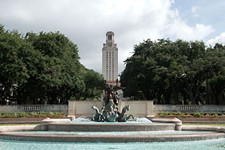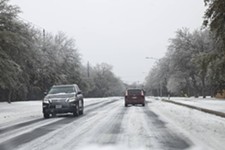What Worked at Webb
By Kimberly Reeves, Fri., Nov. 30, 2007
Like Johnston High, Webb had tried many instructional strategies against similar challenges with its students and its community, with some improvement, but the St. Johns neighborhood middle school continued to fail. AISD Superintendent Pat Forgione was considering Webb as a potential site for an all-boys middle school, akin to the new Ann Richards School for Young Women Leaders on the site of the former Porter Middle School.
Then, something happened. History teacher David Runnels said he'd like to say the credit goes to the teachers, who were certainly concerned but didn't know exactly what to do to turn the school around. Instead, he says, the real victory belongs to two community leaders, neither of whom had a child attending Webb. Allen Weeks and David Delgado, who already were organizing the St. Johns community against crime, agreed to make Webb a priority.
"It was just this huge commitment by a couple of people who got the ball rolling in our community," said Runnels, in his third year at Webb. "Normally, we would have five or six parents show up to a meeting at school. Suddenly last year, we had 50, then 100, then 150 parents showing up for events, meeting with teachers." Suddenly, teachers received working phone numbers for families, and parents began showing up at teacher conferences. When students weren't in their seats on the first day of the Texas Assessment of Knowledge and Skills, parents and volunteers put on Webb T-shirts and walked door-to-door.
It didn't happen overnight. For four years, Weeks and Delgado had been involved in the community. They worked on the Pickle Elementary campus. They hosted block parties, neighborhood cleanups, and unity marches and with that outreach, rid the neighborhood of some of the worst drug dealers. In the process, the neighbors overcame barriers of class, language, and culture.
Johnston High once had these kinds of connections, but the turnover in principals hobbled the effort. Austin Interfaith spent two years organizing the campus before a full-scale community volunteer program was launched on campus. It lasted three years and then burned out. The Rev. John Korcsmar of Dolores Catholic Church, who worked directly with the Johnston effort, said the pressures the school is under – and the attitude of school leaders – has made it difficult to intervene.
"I'm not close to Johnston any more, but I think there are a number of forces coming together that are making it difficult, if not impossible, to help that school do better," Korcsmar said. "There really isn't an openness to get other people to work with them, Austin Interfaith or anyone else. There just seems like there's less and less of an opportunity and less and less of a desire on the part of the school." He says part of the problem is that the district simply doesn't know how to work with parents. "For whatever reason, the school system seems to be not quite sure if they really want volunteers on campus. It's as if they've rounded the wagons in a defensive mode," Korcsmar said. "Almost any school, Johnston included, says, 'We need parental involvement.' But when you get the parents there, they usually say, 'We don't know what to do with them.'"
David Greco, a teacher who helped organize the Johnston team, said Austin Interfaith focused on building a leadership team and then adding programs, such as summer youth employment and afterschool tutoring. The program ended just after the school fell into the "low-performing" category; Greco doubts that any of the teachers who worked with the program are still there. "I would say we were an important part of what was happening on the campus. We started to see some results from the work," Greco said. "I don't want to overstate our impact, but I do think we saw demonstrated results, including better test scores."
When the announcement went out that Webb faced closure, Weeks and Delgado immediately called together a core group of 40 parents. Then they started making phone calls, walking door-to-door, and collecting phone numbers. And they didn't stop. Weeks estimated the group made not hundreds, but thousands, of phone calls last spring. "First off, we told them: 'We're going to agree that this school will not close. This will not happen. We are not going to let it happen,'" Weeks said. "We kept that in our heads, right from the beginning. And we started talking with our parents about what kind of community support we could offer to make this a better school."
These Webb parents, many poor and some non-English-speaking, took ownership of their school. At Johnston, on the other hand, the parents have not been organized in such a fashion since Austin Interfaith pulled out of the school three years ago. Johnston has volunteers – both alumni and local community groups – but it doesn't have the roots of a community-driven volunteer effort. At Kirk Watson's town hall meeting, Johnston parents were concerned but frustrated. Instead of talking about solutions, audience members spent a lot of time pointing fingers at one another. On Nov. 17, just before Thanksgiving, administrators and parents, including about 50 volunteers, did take part in a house-to-house block walk for Johnston, hoping to boost attendance. Nevertheless, overall enrollment continues to drop.
"Anger is good for a night or a week, and then you're done with it," Weeks said. "It doesn't have much of a purpose anymore. You've got to get on the same side of the problem, and you have to do it quickly. I told my parents, 'We may not always agree with Dr. Forgione's plans, but we've got to work with him.'"
"When you're talking about schools like Webb and Johnston, the problems that are pulling them down are far beyond academics," Weeks said. "The school system has been hesitant to really go down that road. All the things that happen with kids outside the school hours are really difficult to address." So at Webb, the city paid for a social worker, three nurses volunteered, and six people from a Spanish-language church were trained to be health-care advocates. All these people together created a family resource center that meets with each family entering Webb and assesses employment, health care, and housing issues. Weeks credits that intervention with retaining 30 students who otherwise might have left the Webb community.
Korcsmar said introducing social services onto AISD campuses has been difficult. Even the simplest act – like introducing a school clinic on the Zavala Elementary campus – can turn into a political football, over issues like the possible distribution of birth control. What should be a simple health-care intervention becomes a serious headache for both the school and district. "At times, it's like a closed society," Korscmar said. "They'll invite people in, but they don't always understand what the school needs to do."
Got something to say on the subject? Send a letter to the editor.








